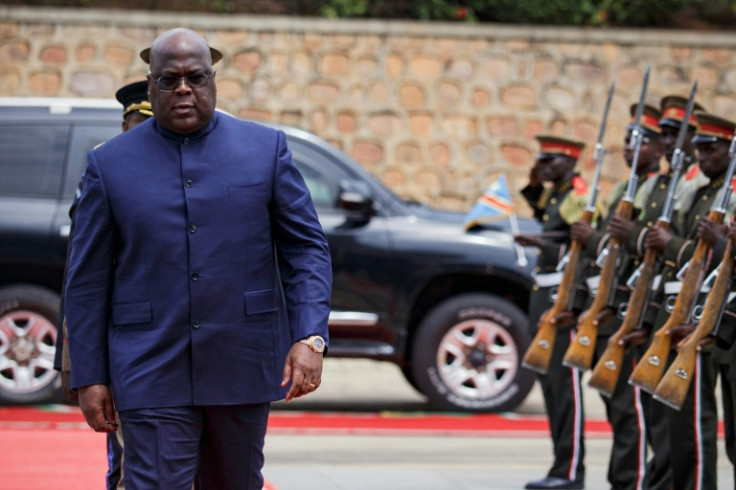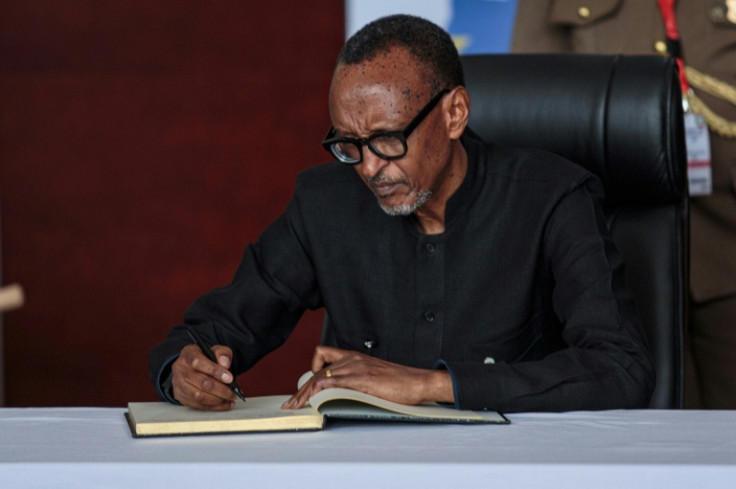East African Leaders Urge 'Immediate Ceasefire' In East DR Congo

East African leaders called Saturday for an immediate ceasefire in the eastern Democratic Republic of Congo, at an extraordinary summit called to find ways of calming the raging conflict.
The talks were hosted in Burundi by the seven-nation East Africa Community (EAC), which is leading mediation efforts to end the fighting in the vast central African nation.
A resurgent rebel group known as the M23 has taken swathes of land in the mineral-rich east and fighting is contiuing despite a peace roadmap hammered out in the Angolan capital in July last year and the deployment of an EAC force in November.
The heads of state called for an "immediate ceasefire by all parties" and the withdrawal of all armed groups, including foreign, in a statement issued after the summit.
They directed army chiefs to meet within a week to set timelines for the withdrawal, while also highlighting "the need for enhanced dialogue among all the parties".
Both present in Burundi's lakeside economic hub of Bujumbura were DRC President Felix Tshisekedi and President Paul Kagame of Rwanda.
Kigali has been accused of backing the M23 in a conflict that has sent many Congolese fleeing their homes and exacerbated regional tensions.
Tens of thousands of people are "caught in the vice of armed violence" in the face of the recent advance of M23 rebels in the east, the UN's humanitarian coordination office in DRC said in a statement Saturday.
In a statement ahead of the summit, the Congolese presidency had called for the EAC force to be made more "offensive" to tackle the rebels.
It protested that despite the terms of the Luanda roadmap the M23 and its allies had not withdrawn but rather "expanded their areas of occupation".
Kagame's visit, his first to Burundi since 2013, also suggested some rapprochement between the Great Lakes neighbours whose relations have long been frosty.
The EAC meeting took place shortly after a visit by Pope Francis to Kinshasa, where he met victims of the conflict and condemned the "inhumane violence" and "brutal atrocities" taking place.
Militias have plagued the mineral-rich eastern DRC for decades, many of them a legacy of regional wars that flared during the 1990s and the early 2000s.
Since November 2021, the M23 has seized chunks of territory and come within miles of the east's main commercial hub Goma.
The EAC decided to create a military force to pacify eastern Congo in 2022, with the first troops arriving in Goma in November.
Kenya's President William Ruto said the security situation remained "fragile and regressing as more and more civilians bear the burden of the conflict".
He also said there was a need for action to protect the sovereignty of Congo's mineral riches, a key source of its myriad conflicts.
The DRC is awash with minerals and precious stones, but the decades of war and chronic mismanagement mean that little of the vast wealth trickles down to the population of some 100 million.
Kinshasa's accusations that Kigali is backing the M23 are supported by UN experts, the United States and other Western countries, but Kigali denies the charge.
Last week, Qatar had planned to host a meeting between Tshisekedi and Kagame, but diplomats said the Congolese leader refused to attend.
Tensions between the two countries were inflamed last week when Rwandan forces opened fire at a Congolese fighter jet they said had violated Rwandan airspace.
Kinshasa described it as an attack that amounted to "an act of war".
Meanwhile, the leaders of Burundi and Rwanda greeted each other warmly in Bujumbura after years of tempestuous relations and accusations of interference in their internal affairs.
In 2020, Kagame urged the then newly elected President Evariste Ndayishimiye to reset diplomatic ties but his overture was rejected as "hypocritical".
Burundi has accused Rwanda of harbouring those behind a failed 2015 coup that plunged the country into violent chaos.

© Copyright AFP 2025. All rights reserved.





















